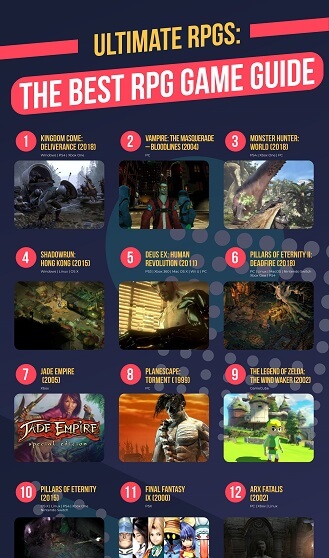
Level Up Your Adventure: A Comprehensive Guide to RPG Games
Role-Playing Games (RPGs) are more than just games; they’re portals to other worlds, opportunities to forge your own legend, and immersive experiences that can captivate for hundreds of hours. From slaying dragons in fantastical kingdoms to navigating dystopian futures and unraveling cosmic mysteries, RPGs offer a diverse tapestry of narratives, characters, and gameplay mechanics. But with such a vast and ever-expanding genre, diving in can feel overwhelming. This guide is designed to equip you with the knowledge and strategies to navigate the world of RPGs, ensuring you get the most out of your adventures.
Understanding the Core Pillars of RPGs:
At their heart, RPGs are built upon a few fundamental pillars:
- Character Creation and Development: This is arguably the most defining aspect. You’re not just controlling a pre-defined protagonist; you’re creating your own. This involves choosing a race, class, background, and often customizing appearance and personality. As you progress, you’ll earn experience points (XP) to level up, improving your character’s stats (strength, dexterity, intelligence, etc.) and unlocking new skills and abilities. This continuous growth is what makes RPGs so rewarding.
- Story and Narrative: RPGs are often driven by compelling stories, ranging from epic quests to personal narratives. Expect intricate plots, memorable characters (both allies and enemies), and meaningful choices that impact the world around you. The narrative can be linear or open-ended, offering varying degrees of player agency.
- Exploration and World-Building: RPGs typically feature expansive worlds ripe for exploration. These worlds can be meticulously crafted with rich lore, diverse environments, hidden secrets, and bustling cities. Exploration often rewards players with valuable items, new quests, and deeper insights into the game’s history and culture.
- Combat and Strategy: Combat is a frequent component of RPGs, although its prominence and style vary greatly. It can range from real-time action combat to turn-based strategic battles. Understanding your character’s strengths and weaknesses, utilizing skills effectively, and employing tactical maneuvers are crucial for survival.
- Choices and Consequences: Your decisions matter in RPGs. Dialogue choices, actions taken during quests, and even seemingly minor interactions can have lasting consequences on the story, relationships with other characters, and the overall outcome of the game. This element of player agency is what makes RPGs so immersive and replayable.
Navigating the Subgenres:
The RPG genre is incredibly diverse, encompassing numerous subgenres that cater to different tastes. Here’s a breakdown of some of the most popular:
- Fantasy RPGs: This is the most traditional and arguably the most popular subgenre. Expect settings inspired by medieval Europe, filled with magic, dragons, elves, dwarves, and epic quests to save the world. Examples include The Elder Scrolls V: Skyrim, The Witcher 3: Wild Hunt, and Dragon Age: Inquisition.
- Sci-Fi RPGs: These RPGs transport you to futuristic worlds, often featuring advanced technology, space exploration, alien encounters, and cyberpunk themes. Examples include Mass Effect Legendary Edition, Cyberpunk 2077, and Starfield.
- Action RPGs (ARPGs): These games emphasize fast-paced, real-time combat with less focus on intricate character builds and dialogue choices. They often feature loot-driven progression and repetitive gameplay loops. Examples include Diablo IV, Path of Exile, and Grim Dawn.
- Turn-Based RPGs: These games prioritize strategic thinking and tactical combat. Players take turns controlling their characters, carefully planning their actions. Examples include Divinity: Original Sin 2, Persona 5 Royal, and Baldur’s Gate 3.
- JRPGs (Japanese Role-Playing Games): These games often feature distinct art styles, melodramatic storytelling, and turn-based combat systems. They tend to be more linear and character-driven. Examples include Final Fantasy VII Remake, Chrono Trigger, and Dragon Quest XI S: Echoes of an Elusive Age.
- MMORPGs (Massively Multiplayer Online Role-Playing Games): These games allow you to play with thousands of other players in a persistent online world. They often feature large-scale raids, social interactions, and ongoing content updates. Examples include World of Warcraft, Final Fantasy XIV, and Guild Wars 2.
- Tactical RPGs: These games combine RPG elements with tactical strategy. Combat takes place on a grid-based map, requiring careful positioning and planning. Examples include XCOM 2, Fire Emblem: Three Houses, and Disgaea 6: Defiance of Destiny.
Tips and Strategies for Success:
Now that you understand the basics, here are some tips and strategies to help you excel in your RPG adventures:
- Plan Your Character Build: Before you even start playing, consider what kind of character you want to create. Research different classes, races, and skills to understand their strengths and weaknesses. Planning your build in advance will help you make informed decisions as you level up.
- Experiment with Different Skills and Abilities: Don’t be afraid to try out different skills and abilities to see what works best for you. Some skills may be more effective in certain situations than others. Experimentation is key to finding your preferred playstyle.
- Read Dialogue Carefully: Dialogue is often crucial for understanding the story, gathering information, and making important decisions. Pay attention to what characters are saying and consider the potential consequences of your responses.
- Explore Thoroughly: Don’t rush through the game. Take your time to explore the world, discover hidden areas, and talk to NPCs. Exploration often rewards you with valuable items, new quests, and deeper insights into the lore.
- Manage Your Inventory: Inventory management is a crucial skill in many RPGs. Keep track of your items, sell what you don’t need, and prioritize essential resources like potions and crafting materials.
- Crafting and Enchanting: Many RPGs feature crafting and enchanting systems that allow you to create powerful weapons, armor, and consumables. Invest time in learning these systems to gain an edge in combat.
- Learn Enemy Weaknesses: Understanding your enemies’ weaknesses is essential for survival. Experiment with different weapons, skills, and tactics to find the most effective ways to defeat them.
- Save Frequently: This is a golden rule for any RPG player. Save your game often, especially before making important decisions or entering challenging areas. This will allow you to reload if things go wrong.
- Don’t Be Afraid to Ask for Help: If you’re struggling with a particular quest or boss, don’t be afraid to ask for help. There are plenty of online resources, communities, and guides available to assist you.
- Embrace the Role-Playing Aspect: Remember, you’re playing a role. Try to immerse yourself in the character you’ve created and make decisions that align with their personality and motivations. This will enhance your enjoyment of the game and make the experience more meaningful.
The Future of RPGs:
The RPG genre continues to evolve, with developers constantly pushing the boundaries of storytelling, gameplay, and technology. We can expect to see even more immersive and dynamic worlds, more complex character development systems, and more innovative ways to interact with the game world. Virtual reality (VR) and augmented reality (AR) have the potential to revolutionize the RPG experience, blurring the lines between the virtual and real worlds.
Conclusion:
RPGs offer a unique and rewarding gaming experience. By understanding the core principles, exploring the different subgenres, and applying the tips and strategies outlined in this guide, you can embark on countless adventures and forge your own legendary tales. So, grab your sword, prepare your spells, and get ready to level up your gaming experience! The world of RPGs awaits.

